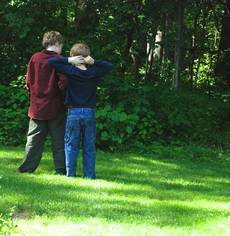One of my favourite posts this summer has been Your Body Is Not Disgusting. I based my statements on a Pan American Health Organization article, which stated that for the most part, our bodies after death no longer are able to spread disease and that the living are more of the culprit in spreading disease. We have seen, however, in the last month the devastation the Ebola has left in West Africa. Here the normal death rituals must be abandoned if the disease is to end. Ebola is one of the rare diseases that can spread to others even after death. Ebola spreads through direct contact with the body and bodily fluids, where pathogens live after the death of the person for some time.
The World Health Organization (WHO) states that when a person with Ebola dies, the body must be cleaned with bleach, and placed in two body bags. The body is then taken to a grave, and buried approximately six feet under. No family accompanies the body, and often times the family has no idea where the body has been buried. The vehicle is also cleaned with bleach.
Let us look at the funeral and burial practices of West Africa to see why this has caused such friction between the people and the medical world that serves them. West African burial rites are not too far removed from many of our own practices, or practices of our grandparents or great grandparents. The body is cleaned and dressed. People morn and dance. At last the mourners gather for the final kiss before the burial, which takes place near the home so that the soul of the one who has died may not be lonely. My own community has a final kiss. We too mourn. I remember dancing in my grandfather’s home following his funeral. Our cultural norms here stem from the wide variety of cultures that compose our own individual families. We are free to pick and choose which rites speak to us and apply them to our rites of transition. Death is one of those transitions. West Africa may not have the flexibility in culture to choose different rites. These rites are long lived in the fabric of that society. We may not fully understand since we freely choose how we stage our weddings and funerals.
When people go into the hospital and do not come out; their body taken and buried somewhere the family does not know it gives rise to mistrust and avoidance of medical help. Then fear helps spread the disease. I do not pretend to know how this can be fixed. For those facing Ebola, they might not have a mechanism in their culture to easily changed or modify tradition to fix the crisis I hope better communication between the medical world and the people it serves will help create an atmosphere where people will seek help and when death comes, a new or modified form of mourning might take place.
There are a few others of these - bloodborne gastrointestinal respiratory- diseases that might spread disease following death. They require universal precautions and the washing of hands to keep the person handling the bodies from direct contact with bodily fluids. For the most part, after some time has lapsed and the body has been washed, these bodies do not pose a threat. Others like Creutzfeldt–Jakob Disease pose a risk for the funeral director who opens the body and drain the blood in the embalming procedure. I recommend reading the Pan American Heath Organization’s article: Infectious disease risks from dead bodies following natural disasters. I found it very interesting and provides a thorough explanation of death and disease.
In General, if you leave the body intact and do not embalm the body, the body once cleaned should not cause trouble unless you have Ebola. Leaving our bodies intact is the best way to keep our environment healthy. In test of ground water around cemeteries, the water shows evidence of decay, but it does not spread far and is due mostly to products used in the death care industry (coffins and embalming fluid). Our bodies are not usually disgusting, but once in awhile there comes a disease like Ebola which throws that idea out the window, and we must take steps to make sure the bodies are taken care of in a particular manner.


 RSS Feed
RSS Feed